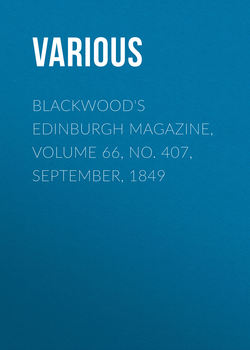Читать книгу Blackwood's Edinburgh Magazine, Volume 66, No. 407, September, 1849 - Various - Страница 4
THE CAXTONS. – PART XVI
CHAPTER XCVII
ОглавлениеThe weeks and the months rolled on, and the replies to Vivian's letters came at last: I foreboded too well their purport. I knew that my father could not set himself in opposition to the deliberate and cherished desire of a man who had now arrived at the full strength of his understanding, and must be left at liberty to make his own election of the paths of life. Long after that date, I saw Vivian's letter to my father; and even his conversation had scarcely prepared me for the pathos of that confession of a mind remarkable alike for its strength and its weakness. If born in the age, or submitted to the influences, of religious enthusiasm, here was a nature that, awaking from sin, could not have been contented with the sober duties of mediocre goodness – that would have plunged into the fiery depths of monkish fanaticism – wrestled with the fiend in the hermitage, or marched barefoot on the infidel, with the sackcloth for armour – the cross for a sword. Now, the impatient desire for redemption took a more mundane direction, but with something that seemed almost spiritual in its fervour. And this enthusiasm flowed through strata of such profound melancholy! Deny it a vent, and it might sicken into lethargy, or fret itself into madness – give it the vent, and it might vivify and fertilise as it swept along.
My father's reply to this letter was what might be expected. It gently reinforced the old lessons in the distinctions between aspirations towards the perfecting ourselves – aspirations that are never in vain – and the morbid passion for applause from others, which shifts conscience from our own bosoms to the confused Babel of the crowd, and calls it "fame." But my father, in his counsels, did not seek to oppose a mind so obstinately bent upon a single course – he sought rather to guide and strengthen it in the way it should go. The seas of human life are wide. Wisdom may suggest the voyage, but it must first look to the condition of the ship, and the nature of the merchandise to exchange. Not every vessel that sails from Tarshish can bring back the gold of Ophir; but shall it therefore rot in the harbour? No; give its sails to the wind!
But I had expected that Roland's letter to his son would have been full of joy and exultation – joy there was none in it, yet exultation there might be – though serious, grave, and subdued. In the proud assent that the old soldier gave to his son's wish, in his entire comprehension of motives so akin to his own nature – there was yet a visible sorrow; it seemed even as if he constrained himself to the assent he gave. Not till I had read it again and again, could I divine Roland's feelings while he wrote. At this distance of time, I comprehend them well. Had he sent from his side, into noble warfare, some boy fresh to life, new to sin, with an enthusiasm pure and single-hearted as his own young chivalrous ardour – then, with all a soldier's joy, he had yielded a cheerful tribute to the hosts of England; but here he recognised, though perhaps dimly, not the frank military fervour, but the stern desire of expiation – and in that thought he admitted forebodings that would have been otherwise rejected – so that, at the close of the letter, it seemed not the fiery war-seasoned Roland that wrote, but rather some timid, anxious mother. Warnings and entreaties, and cautions not to be rash, and assurances that the best soldiers were ever the most prudent – were these the counsels of the fierce veteran, who, at the head of the forlorn hope, had mounted the wall at – , his sword between his teeth!
But, whatever his presentiments, Roland had yielded at once to his son's prayer – hastened to London at the receipt of his letter – obtained a commission in a regiment now in active service in India; and that commission was made out in his son's name. The commission, with an order to join the regiment as soon as possible, accompanied the letter.
And Vivian, pointing to the name addressed to him, said, "Now, indeed, I may resume this name, and, next to Heaven, will I hold it sacred! It shall guide me to glory in life, or my father shall read it, without shame, on my tomb!" I see him before me, as he stood then – his form erect, his dark eyes solemn in their light, a serenity in his smile, a grandeur on his brow, that I had never marked till then! Was that the same man I had recoiled from as the sneering cynic, shuddered at as the audacious traitor, or wept over as the cowering outcast? How little the nobleness of aspect depends on symmetry of feature, or the mere proportions of form! What dignity robes the man who is filled with a lofty thought!
